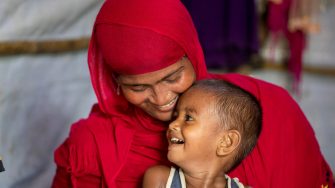
Ahead of the May federal election, which will have critical implications for people seeking protection in Australia, the Andrew & Renata Kaldor Centre for International Refugee Law released updated Principles for Australian Refugee Policy .
These evidence-backed Principles, in full and summary form, show how Australia can respond to the crises of tomorrow and today, including the millions of people recently forced from their homes by the Taliban takeover in Afghanistan and Russia’s invasion of Ukraine.
As the Preface to the new edition notes: ‘In Australia, extended lockdowns and border closures during COVID-19 meant that for the first time, many people had an insight into some of the deprivations that are hallmarks of displacement – the inability to cross borders lawfully, loss of liberty, confinement, separation from family and friends, and extreme uncertainty. But whereas for them, these measures were temporary, for many refugees and other displaced people, such limbo is permanent.
‘With Australia’s borders reopened, we now have a particular opportunity – indeed, responsibility – to rethink and reset Australia’s asylum policies, drawing on this newfound understanding.’
The Kaldor Centre Principles for Australian Refugee Policy explain the ‘what’, ‘why’ and ‘how’, with examples of best practice from around the world. They show that an approach that is humane and manageable is possible.
The Principles include the recommendation that asylum claims should be processed in Australia, not offshore, and in March the government announced that 450 refugees who were subject to Australia’s offshore processing regime will be resettled in New Zealand. The Kaldor Centre’s statement welcoming the agreement noted, however, that ‘it will not provide solutions for everyone who has been caught in Australia’s offshore processing regime, which means that work must continue to find humane and durable outcomes.’
The Kaldor Centre also delved into the March federal Budget, including the costs of detention and refugee intakes from the crises in Afghanistan and Ukraine.
Image credit: UNHCR/Saikat Mojumder
